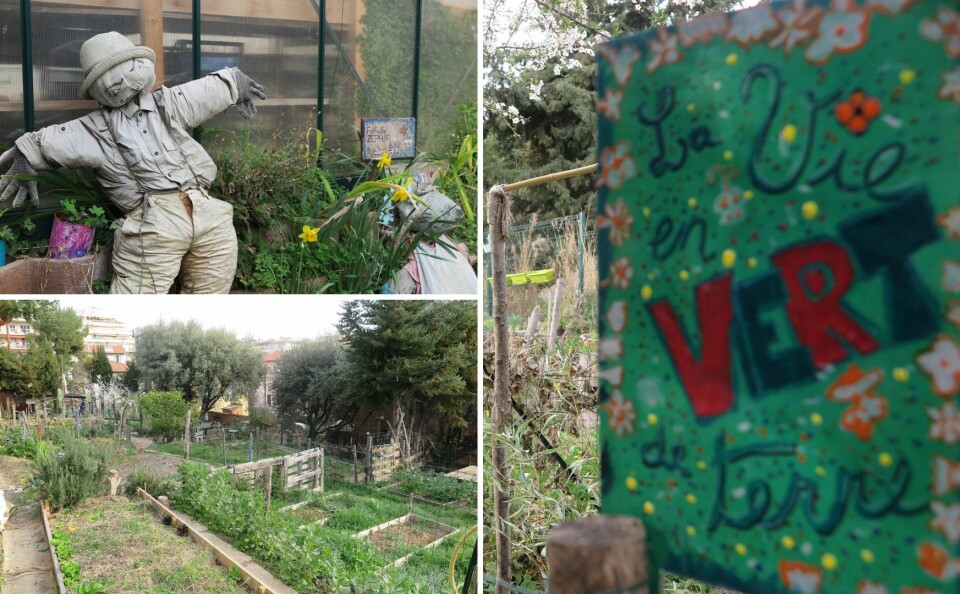-
‘It’s becoming intolerable’: homeowners in France move north to escape the heat
Heatwaves becoming more regular and intense
-
From Oregon to Brittany: primrose nursery in France celebrates 90th anniversary
Barnhaven Primroses traces its history back to 1930s America
-
More communes in France distribute Asian hornet traps
Residents are increasingly receiving help, with now the best time to capture the queens
Gardening in France: All ages learn about ecology together in Nice
Young and old grow food, learn how to ‘vivre ensemble’ and protect the planet at this pedagogical garden

The pedagogical garden of the Prieuré du Vieux-Logis museum in Nice was opened six years ago to provide a green space in which students, associations and private individuals could grow plants and learn about ecological values.
Gardens teach how to live together
It is part of a collection of several gardens owned and run by Appese, an association of volunteers that has been providing lessons to children, and which has expanded lately into activities surrounding social and solidarity economics.
Read more: Community gardens can help restore democratic values in France
Public gardens on the rise after WW2
Public gardens in France belong in two categories: the collective garden that comprises familial, community and shared gardens, and the pedagogical garden, which is for educational purposes.
The total number of pedagogical, collective, shared and family gardens is unknown, but they have been steadily increasing since 2000, after having been abandoned or used for other activities after WW2.
Most French regions list several hundreds of collective and pedagogical gardens.
Nice counted 186 in December 2018, according to an estimation provided by the Métropole Nice-Côte d’Azur.
Garden has many uses
“The location helps with the values of vivre-ensemble and everything attached to democracy,” said René Fiaschi, 80, the president of Appese, adding that the space was both called a pedagogical and a shared garden.
The 100-metre-square area is situated on the hills of the museum.
The open-air space counts several clusters of land dedicated to separate gardening activities, each dedicated to different categories of people.
The very back of the area is assigned to waste like vegetable and fruit peelings, or fig-tree branches, all of which help to feed a big composting area that then creates soil for gardens.
The shared garden contains a section called jardino-therapy, in which a psychiatrist and a gardener give three-hour lessons every other Wednesday to children.
The activity is financed by the Agence nationale de santé, France’s national health agency, Mr Fiaschi told The Connexion.
The shared garden also features a greenhouse.
Children are committed to ecology
Most of the space is allocated to educational activities where children from pre-school to high school can work on dedicated portions of the garden.
One section saw high-school students grow wheat to produce flour last year.
Another is put aside for toddlers to play with mud.
A third area helps students enrolled in agricultural studies to understand more complex activities.
“The children understand the ecological challenge of our time. They have a common sense of protection towards the environment,” said Mr Fiaschi, who confessed he was ‘amazed’ by younger generations and their commitment to ecology.
Growing and sharing food
Members of Appese, other associations and members of the commune can also grow plants, fruits and vegetables in a part of the shared garden.
Here, two people can share a 35-metre-square parcel of land.
Gardeners come together on Thursdays to share coffee and bring salad plants and other commodities.
Self-sufficient and sustainable methods
Gérard Gormotte has been part of the group for many years.
“I am able to live self-sufficiently on fruit and vegetables during the summer thanks to this garden,” he said, adding that he can do that because he also eats more unconventional vegetables.
The gardeners use two agriculture techniques of responsible farming: one that rejects all pesticides, and permaculture, a self-sufficient and sustainable agricultural ecosystem.
One parcel grows potatoes to be donated to the Secours Populaire, a French non-profit organisation that fights poverty.
Related articles
Five drought management tips for gardens from a French plant expert
Donations from open garden scheme fund gardens in 60 French hospitals
Biodiversity: Are Asian ladybirds threatening their French cousins?
























